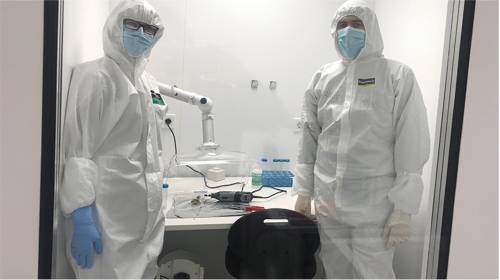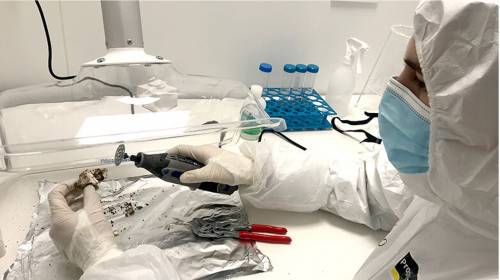Laboratory for Archaeogenetics (LAZAG)
Under the KK.01.1.1.06 call "Development and Strengthening of Synergies with Horizontal Activities of the Horizon 2020 Program: Twinning and ERA Chairs" and the specific objective "Increased capacity of the research, development, and innovation (RDI) sector to conduct high-quality research and meet industry needs," the project KK.01.1.1.06.0002 established the Laboratory for Archaeogenetics at the Faculty of Agriculture University of Zagreb - LAZAG. Built in 2021 in Pavilion II/I, this laboratory is designed according to high modern "Clean Room" standards, with a 100% ventilation-per-minute filtered air system. It is equipped with advanced technology, enabling the isolation and molecular typing of small amounts of highly degraded DNA, often found in animal bones and other tissues.
Purpose of LAZAG
The laboratory's primary goal is to study pre-domestication, domestication, genetic adaptations, and migrations from the Paleolithic to the present day, analyzing how these changes shaped today’s domesticated animal species, population sizes, and genetic diversity.
Significance of LAZAG
This project contributes to preserving Croatia's biological and cultural identity and supports its smart specialization strategy, creating conditions for future cooperation with EU institutions and enhancing the international ranking of the Faculty of Agriculture.
What is Archaeogenetics?
Archaeogenetics is a branch of genetics that studies ancient DNA (aDNA) using various molecular-genetic methods. This young and prestigious scientific discipline, accelerated by next-generation sequencing (NGS), often publishes research in leading scientific journals. Croatia, known for numerous archaeological sites rich in biological materials (animal and human bones), has gained valuable insights into human history. The Laboratory for Archaeogenetics was established to enable cutting-edge research and foster scientific collaboration among geneticists and scientists studying the past (archaeologists, geologists, biologists, etc.), making it the first of its kind in this part of the EU.
Training in archaeogenetics demonstrates knowledge and skills, representing scientific excellence that raises education standards in applied genetics (human and veterinary medicine, agriculture, forestry, biology, etc.) to a higher level. Research conducted in the laboratory focuses on the following topics:
- the origin of domestication and genomic changes in the domestication process,
- the analysis of human and animal migrations in the Neolithization process,
- the identification of alleles significant for climate and functional adaptations (seeking lost functional variability),
- the estimation of effective population size and genome admixture based on high-resolution genetic information from a single individual,
- the variability of deleterious mutations in extinct species.
More about the laboratory can be found at: https://angen.agr.hr/hr/group/17/LazAg](https://angen.agr.hr/hr/group/17/LazAg
Contact
Prof. Vlatka Čubrić Čurik, PhD
Laboratory Head
vcubric ( at ) agr.hr





